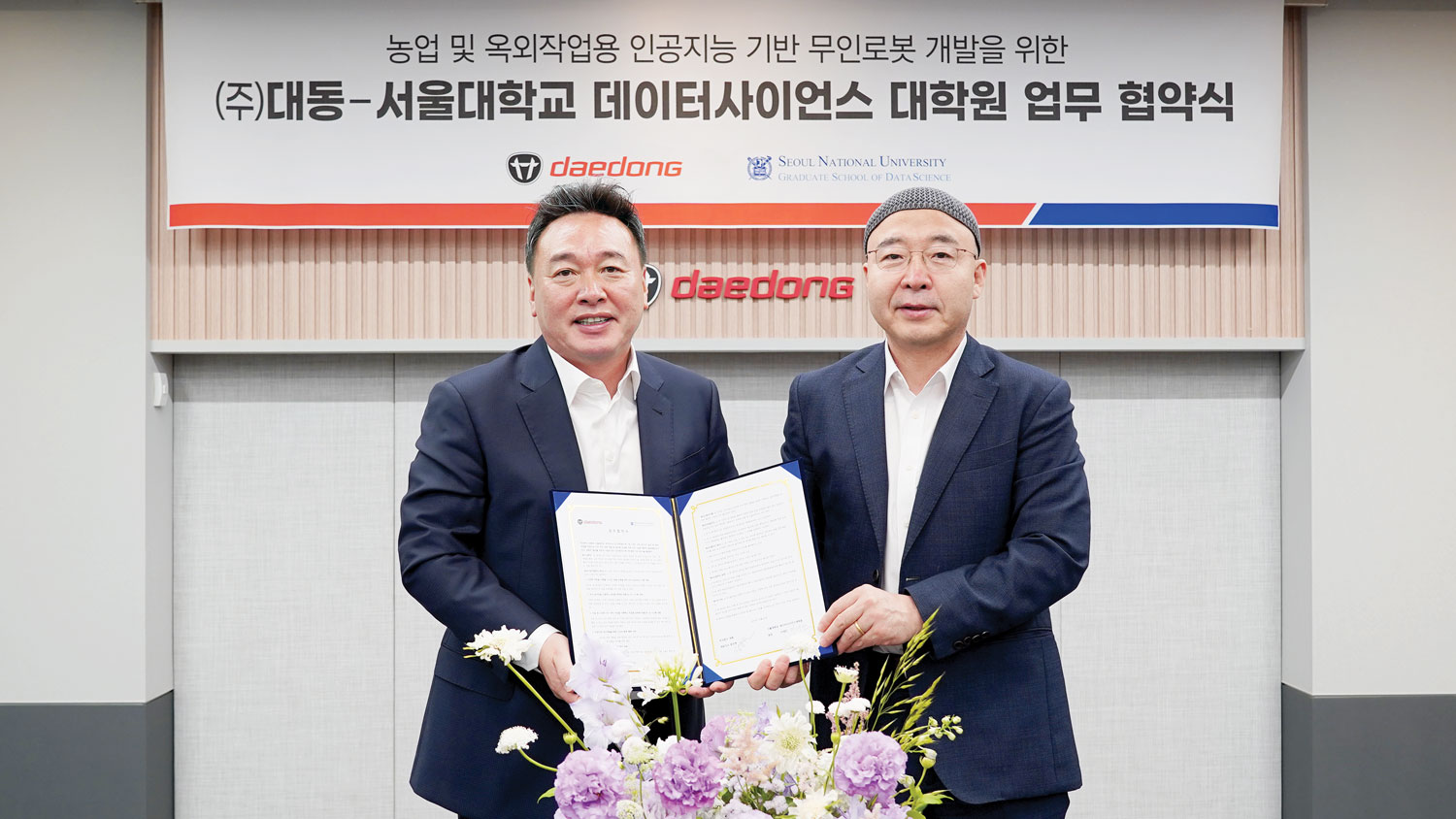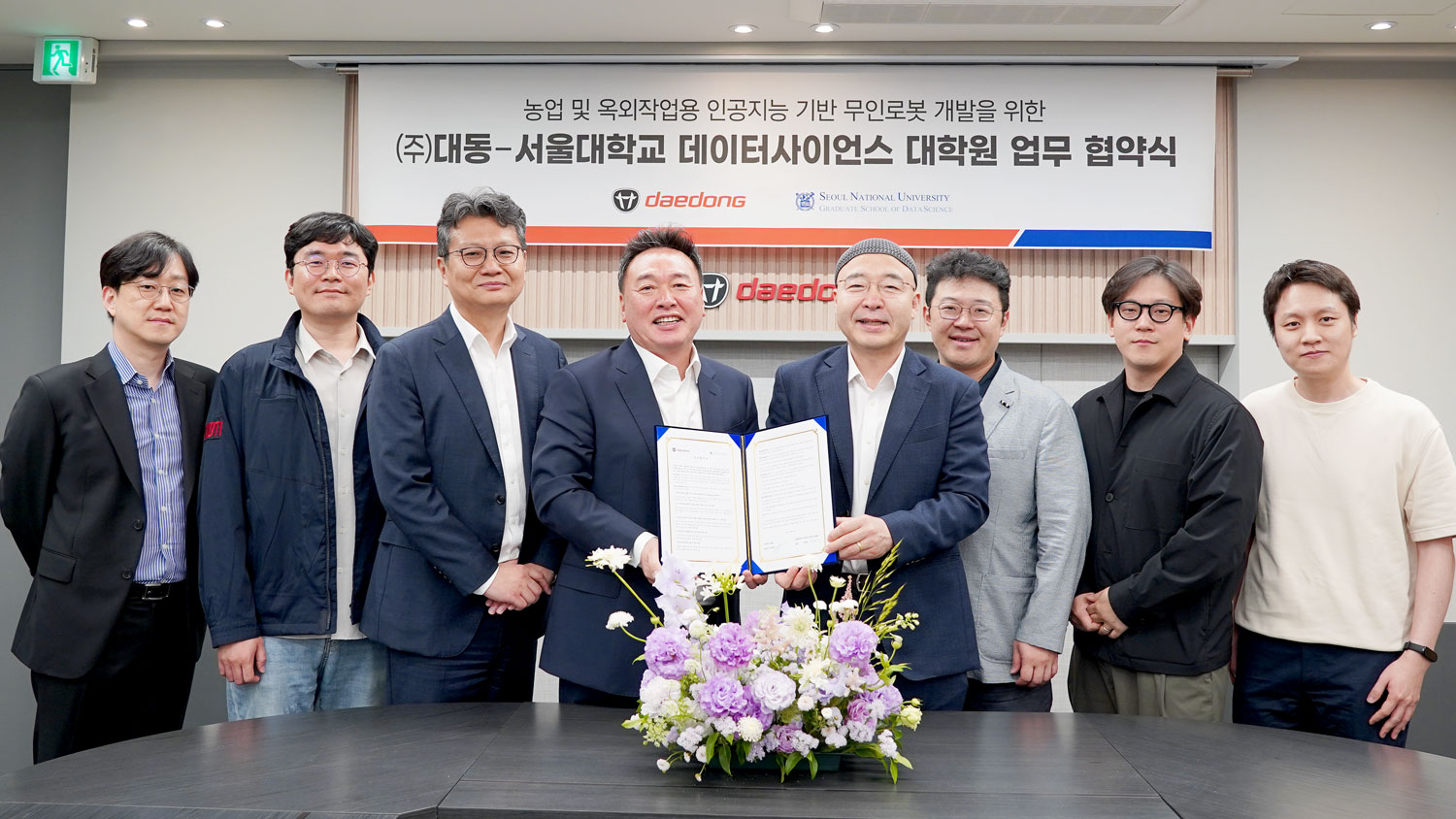Daedong-Seoul National University Graduate School of Data Science, to develop AI-driven agricultural and industrial robots together
Daedong-Seoul National University Graduate School of Data Science,
to develop AI-driven agricultural and industrial robots together
- Daedong plans to collaborate with Seoul National University to develop core robot AI technologies and products to help commercialize agricultural and industrial AI robots
- Company will develop foundation models for robots and push to make AI models for robots lighter... Goal is to speed up the commercialization of robots
- Daedong wants to launch a professional-grade agricultural multifunctional robot by 2028, expected to secure core AI core technology and talented individuals working with Seoul National University
Daedong has joined forces with Seoul National University’s Graduate School of Data Science to speed up its “commercialization of agricultural and industrial AI robots.”
Daedong (Co-CEO: Kim Jun-Sik and Won Yu-Hyun), Daedong Group's parent company and a leading future ag-tech company, announced on June 5 that it signed a business agreement with Seoul National University's Graduate School of Data Science (Dean: Dr. Jaejin Lee) to develop AI-driven agricultural and industrial robot AI together.

Established in 2020, the Graduate School of Data Science develops AI experts equipped for the international stage with multidisciplinary[1] research and data science education focused on AI algorithms, big data, and computing. Under its motto that graduate school education and research should be focused on solving real-world problems, the Graduate School of Data Science focuses on actualizing commercial AI technology through close cooperation with industry stakeholders.
Using the Daedong AI Lab, an AI robot S/W company established in May to help “internalize AI technology” and promote the transformation of Daedong products into AI robots, Daedong is looking forward to developing agricultural and industrial AI robot technology and products in collaboration with the Graduate School of Data Science.
To that end, Daedong Group, through the Daedong AI Lab, is in the process of securing and upgrading technology that can simulate outdoor work environments and robot work in a digital space without investing an astronomical amount of money and time. The Graduate School will jointly develop technology to help learn and test the AI of robots using simulated solutions. Both Daedong and the Graduate School plan to use foundation models for robots[2] to respond to a wide range of variables that occur in the agricultural environment and to understand and perform complex work commands.
Also, in developing multipurpose robots that understand and execute user commands expressed in everyday language, Daedong plans to work with Seoul National University to enable on-device AI implementation to lighten and accelerate its AI models. Furthermore, together with the Graduate School, the company is looking to improve the stability and operability of the MLOps system, which continuously improves the performance of agricultural and industrial robots by automatically re-learning from the user's vast work database.
With the technology developed through its collaboration with the Graduate School, Daedong wants to launch autonomous driving tractors capable of performing various agricultural tasks at an expert level and various agricultural robots that can effectively work on orchards. In fact, Daedong plans to roll out agricultural robots equipped with AI technology, such as transport robots (September) and pest control robots (December), within the year to speed up its commercialization of agricultural and industrial robots. The company also aims to launch an agricultural multifunctional robot by 2028 that understands and performs complex work commands while responding to various variables from the agricultural environment using Large AI technology engineered for robots.

Both partners expect that by securing core AI robot technology, they will earn the capacity to lead the Korean market by speeding up the commercialization of agricultural and industrial AI robots. Daedong plans to develop and acquire highly talented individuals in the AI field by recruiting students involved in projects with Daedong and by training its employees using the Graduate School degree program.
Meanwhile, according to the International Federation of Robotics (IFR), the global robot market is expected to jump from USD 32.4 billion in 2022 to USD 43.3 billion in 2028.
________________________________________
[1] An approach to research or solve problems by integrating multiple academic fields or major fields
[2] Large-scale machine learning model that enables robots to perform a variety of tasks
